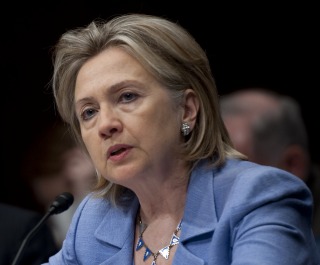 Secretary of State Hillary Clinton's meeting with Israeli Prime Minister Netanyahu last week seems to have ended with an offer: A package of US rewards in exchange for a 90-day settlement construction freeze. The proposal, reportedly, also addresses the contours of direct Israeli-Palestinian negotiations over the next three months, and beyond.
Secretary of State Hillary Clinton's meeting with Israeli Prime Minister Netanyahu last week seems to have ended with an offer: A package of US rewards in exchange for a 90-day settlement construction freeze. The proposal, reportedly, also addresses the contours of direct Israeli-Palestinian negotiations over the next three months, and beyond.Notably absent from the negotiations over the proposal to restart final status talks have been the Palestinians. Assuming that this gambit succeeds, many are predicting that during the three months of the extended settlement moratorium talks would focus on demarcating the border between Israel and the future Palestinian state. Progress on this issue, the theory goes, could defuse the settlements issue and open the door to continued final-status talks.
The package is expected to be approved by the Israeli cabinet on Wednesday, although the vote is not expected to be a slam dunk for Netanyahu.
The package is expected to be approved by the Israeli cabinet on Wednesday, although the vote is not expected to be a slam dunk for Netanyahu.
The package has not been made public, and media reports vary. The following has been compiled from press accounts (and should therefore be taken with a grain of salt):
What Israel gives:
- Israel commits to renew the moratorium on new settlement construction for 90 days. That means that no new construction can begin. Moreover, construction that began since September 26th (when the previous moratorium expired) will be put on hold. The moratorium reportedly will not mention East Jerusalem.
What the US gives:
- The US will deliver 20 F-35 stealth fighter planes - valued at $3 billion - to Israel.
- The US will veto UN Security Council resolutions that negatively impact Israel's interests for the following year. (This is interpreted as a US commitment to thwart a UN-endorsed declaration of an Palestinian independence, which has been floated as an option for the Palestinians should the peace talks fail.)
- The US will not ask for any additional extension of the moratorium after 90 days.
- The US will work to intensify sanctions against Iran.
- The US commits to working to maintain Israel's policy of nuclear ambiguity.
- Should Israel reach a final status deal with the Palestinians, the United States will sign a comprehensive security agreement with Israel.
So, what to make of this offer?
The Obama administration has come under strong criticism for offering so much in exchange for so little. The lead editorial in the New York Times on Saturday called the incentives package "overly" generous. On Friday, New York Times columnist Tom Friedman accused the administration of "basically trying to bribe Bibi." He added that it's "unseemly to watch and doesn't bode well."
Commenting about a similar proposal under discussion a month ago, former American ambassador to Israel Martin Indyk cautioned the Obama administration "to be careful not to pay with strategic coin for mere tactical breathing room." It's possible that the Obama administration did not heed his warning. That would seem to be the case if all that Israel put on the table was a 3-month effort to limit settlement construction.
The imbalance between what Israel is offering and what the US is placing on the table also captured the attention of Israeli pundits, including prominent Yedioth Ahronoth columnist Nahum Barnea. He writes today that:
"Either the assurances [the Obama administration] gave Netanyahu are worth less than the huge headlines that were published in yesterday's newspapers, or else the compensation that Netanyahu will be required to give in return is much more significant than the impression that has been created.
"Both options are interesting. The first portrays Netanyahu as someone who has understood--albeit belatedly--that the Israeli prime minister cannot say no to the US president, not when the settlements lie on one side of the scales and the peace process lies on the other...
"The second option is that Netanyahu convinced the administration that within the three months of the freeze, he would consent to an Israeli withdrawal to the 1967 borders (a land swap at the margins will make it possible to annex part of the settlement blocs to the state). If this is a commitment, then Netanyahu has truly crossed the Rubicon, both ideologically and politically..."
Looking ahead:
For as much as we know about this agreement, there is a great deal yet unknown. Those of us who care about peace for Israel must continue to focus on the basics:
1) Settlement expansion in the West Bank and East Jerusalem is not consistent with a two-state solution. We will therefore press for it to be stopped.
2) Negotiations between Israel and the Palestinians are needed to achieve peace. We will therefore press for the resumption of meaningful negotiations between the sides.